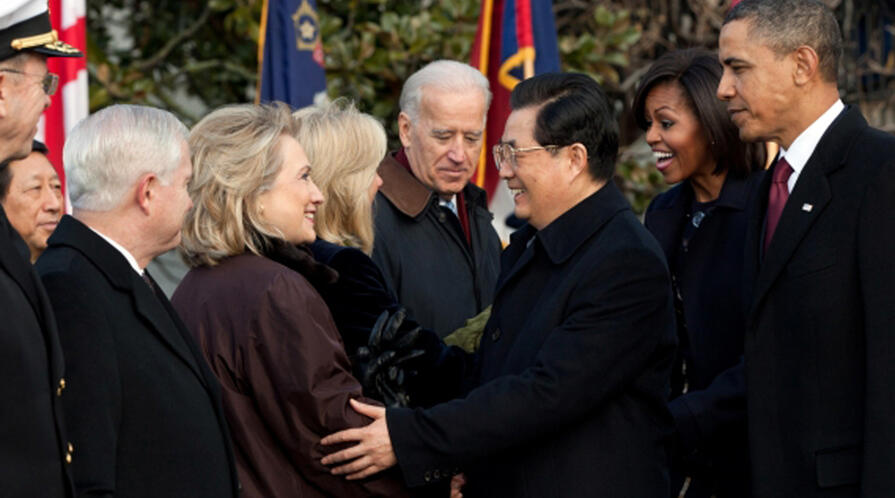AP Scholars Program re-launched after decade-long hiatus
AP Scholars Program re-launched after decade-long hiatus

"The bigger vision of the AP Scholars Program is that the connections live on after the two years, and that they are fruitful because of the friendships and better understanding established during the discussions."
-Thomas Fingar
Oksenberg/Rohlen Distinguished Fellow at FSI
Former President Gerhard Casper launched the Asia-Pacific Scholars Program (AP Scholars Program) in 1997 to strengthen and expand Stanford University's ties with Asia. The program was loosely modeled on Oxford University's Rhodes Scholarship. Led by renowned China scholar Michel Oksenberg of the Asia/Pacific Research Center (the predecessor organization of the Walter H. Shorenstein Asia-Pacific Research Center), the first program brought together a highly diverse class of nineteen graduate students from the United Kingdom, the United States, and numerous countries in Asia. The AP Scholars Program thrived under Oksenberg's direction, but fell dormant for nearly a decade following his death in 2001.
 Thomas Fingar, the Oksenberg/Rohlen Distinguished Fellow at the Freeman Spogli Institute for International Studies and a former chairman of the National Intelligence Council, re-launched the AP Scholars Program in September 2010. "I am delighted to have been asked to revive it," states Fingar. In keeping with its original design, the two-year program is open to Stanford doctoral students from Asia-Pacific countries and to those studying issues related to the region. The twelve current participants come from China, Japan, Korea, Thailand, and the United States, and are studying disciplines ranging from art history to engineering. In the future, incoming students will be invited to participate in the program, creating a dynamic cohort of new and continuing students.
Thomas Fingar, the Oksenberg/Rohlen Distinguished Fellow at the Freeman Spogli Institute for International Studies and a former chairman of the National Intelligence Council, re-launched the AP Scholars Program in September 2010. "I am delighted to have been asked to revive it," states Fingar. In keeping with its original design, the two-year program is open to Stanford doctoral students from Asia-Pacific countries and to those studying issues related to the region. The twelve current participants come from China, Japan, Korea, Thailand, and the United States, and are studying disciplines ranging from art history to engineering. In the future, incoming students will be invited to participate in the program, creating a dynamic cohort of new and continuing students.
The AP Scholars Program serves as a forum for discussing significant and often-sensitive issues relating to the Asia-Pacific region, and for building a strong academic and professional network linking Asia and Stanford. In its current format, it is designed to broaden students' understanding of how U.S. government officials think about and make policy decisions on Asia, and to provide insight into how American scholars study Asia in relation to global issues. Additionally, it offers the significant opportunity for students from different countries and academic disciplines to dialogue not only with one another, but also with leading academics and former senior-level U.S. government officials at Stanford.
"This is really an incredible enrichment opportunity," emphasizes Fingar. Students meet once a month during the academic year for a two-hour dinner seminar featuring a presentation and a question-and-answer session with a guest speaker. These informal sessions offer a rare and a highly insightful window into the experience of individuals who have been involved in recent decades with key policy decisions about Asia and with major research shaping understanding of Asia in the United States. After each presentation, the speaker and students engage in candid dialogue.
During the 2010-2011 academic year, students will hear from academic experts on climate change, nuclear proliferation, and food and energy security, and from former senior U.S. government officials who served in the Department of Defense, the Department of State, the National Intelligence Council, and Congress. Fingar leads a wrap-up discussion after each presentation, during which the students provide their own perspectives on the issues presented. In this environment, difficult topics are discussed in an open, and thoughtful manner. There are no readings or other outside preparation required to participate in the AP Scholars Program.
Waraporn Tongprasit, a student with the Department of Management Science and Engineering who is originally from Thailand, appreciates the different issues discussed during the presentation sessions, and the opportunity for networking that the program offers. "Through the AP Scholars Program, I am learning about political, social, and economic issues in my home country and region, and about the perspective of U.S. scholars and the U.S. government on these issues," she says. "I also have an opportunity to establish connections with other students from the Asia-Pacific region who are experts in many different areas."
Yezhou Shi, a Materials Science and Engineering student from China, values the unique chance to speak so candidly with prominent scholars and former government officials, and to hear about their experience with major global issues and events. "These are stories that I could probably never know without attending the AP Scholar Program seminars—these are really inside stories," he says. Shi also enjoys the opportunity to speak with students from different countries on issues that he would not normally feel comfortable discussing. "In daily conversation, I would not bring up some of these issues unless it was with a really close friend," he stresses. "[In the program,] of course, I pay attention to what I say, but I think that everyone understands that we are there to discuss important issues."
Fingar is optimistic as he looks to the future of the program, and its continuing impact after the current class of students completes it in 2012. "The bigger vision of the AP Scholars Program is that the connections live on after the two years," he says, "and that they are fruitful because of the friendships and better understanding established during the discussions."
Pacific Vision: The inaugural AP Scholars class
The film Pacific Vision was released in 1998 to commemorate the AP Scholars Program's inaugural year. A clip from the film, featuring interviews with Casper and Oksenberg, is available here courtesy the Stanford University Archives.
